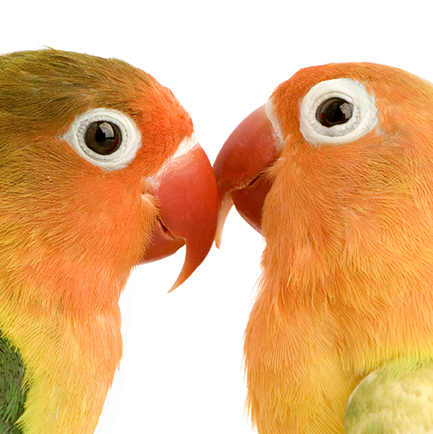Planning for your first feathered friend
I hope you’ve enjoyed my first couple of blogs about considering non-traditional pets for your home and how to care for them. So far, I’ve shared my thoughts about the best lizards and snakes for folks who have never had them. I realize that these pets aren’t for everyone. If you’re not into scaly creatures, let’s talk about birds and what to think about when choosing your first bird. In an upcoming blog I will talk about which birds I think are great choices as a beginner; but in this blog, I really want to focus on factors to consider if you are contemplating getting a bird as a companion.
Birds can be a lot of fun- with a wide variety of sizes, colors and talents- including their ability to sing and talk. But birds require just as much care as any other pet. They need your time, attention and affection- as well as an appropriate habitat, which for most birds is an appropriately sized cage. Here’s what you’ll need to keep in mind when considering a bird.

You may need to adjust your sleep schedule
Birds, like most humans, are awake during daylight hours. If you like to sleep in to the crack of 10, keep in mind, your birds will be up for hours before you are. That means they will probably be chirping, singing or talking while you’re still trying to catch some shuteye. If you prefer sleeping in, a bird may not be the right pet to consider.
What does your schedule look like?
Do you have time for a bird? Some of the more intelligent birds (African Greys, large parrots) require daily interaction to be happy. If they don’t get the attention they expect, they can become destructive and let you know they’re not happy. If you don’t have the time to interact with them on a daily basis, consider a bird that requires less attention.
It may not be the best home-office pet
If you work out of the house, and spend lots of time on the phone with clients or customers, a noisy bird can cause lots of distractions if you’re constantly doing business over the phone. Not all birds are loud, but sometimes a poorly timed squawk or screech may be distracting to you or the person on the other end of the call.
Consider your neighbors
If you live in an apartment, condo or townhouse, will your neighbors appreciate a screeching bird? Larger parrots can make lots of noise, especially when they’re stressed or upset- and their noises can easily be heard through walls.
Check your kitchen for teflon
Birds have highly sensitive respiratory systems (no comma needed) and they can’t tolerate many things. Fumes created by non-stick pans can be deadly for your birds. When non-stick surfaces are overheated, the fumes are toxic and can kill birds in a matter of minutes. If you cook with cast iron or stainless steel, you have nothing to worry about- but non-stick is a no-no if you have birds. There’s a number of other things commonly found in homes, including plants and artificial scents that could pose a danger to your bird- and I’ll cover all of these in an upcoming blog about potential in-home dangers for birds.
Think about everyone in your household
Some bird species bond with one person and may be stand-offish with others. If you’re looking for a bird that can be handled by everyone in your home, do your research. African Greys and Macaws are often ‘one-person’ birds, and will typically bond with a singular person. If you’re wanting a bird that everyone can handle and interact with, make sure it’s a species that is known to be social.
Are you a neat freak?
If you believe there’s a place for everything, and everything in it’s place- then a bird may cause you some stress. Birds are messy, and their mess doesn’t always remain confined inside the cage. Expect to find lots of food outside their cage on a daily basis and of course throughout the bottom of their cage. It’s best to clean their cage most every day, and sweep up or vacuum the area surrounding their cage every day.

How much space do I have for a bird cage?
When it comes to cages, bigger is almost always better. Think about where the cage could be placed in your house- keeping in mind that air conditioning and heating vents need to be avoided at all costs.
Don’t forget- most birds need to get out of their cage from time to time. Do you have appropriate space in your home that is safe? Can they be kept away from other pets while outside of their cage? Are there ceiling fans or other hazards that can pose a threat?
That’s a lot to think about. Adding a bird to your home requires just as much thought as any other pet, whether it has no legs, two legs or four. In the right environment with the proper amount of time, attention and affection, birds make excellent companions.
